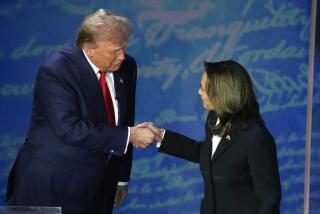Final Debate Judged a Tie -- and ‘Wonkfest’
- Share via
WASHINGTON — While campaign operatives rushed to declare the final presidential debate a triumph for President Bush or Democrat John F. Kerry, television pundits came to no consensus Wednesday night on which candidate did better in a clash that one called “a bit of a wonkfest.”
An ABC News instant poll, which was weighted slightly toward Republican viewers, found the debate’s outcome a virtual tie. A CBS survey gave a slight edge to the Massachusetts senator.
But such snapshots are frequently poor gauges of how the public assesses a political event. Several commentators were cautious in their appraisals.
NBC’s Tim Russert said Bush and Kerry appeared to be sanding the edges off of their sharpest rhetoric. “The debate was not nearly as negative as people thought it might be,” Russert said.
Noting the dense domestic policy matters the candidates addressed, with tax figures, healthcare statistics and job data flying all night, CNN’s Candy Crowley said, “I thought it was a bit of a wonkfest.”
She said the candidates showed “some real genuine moments of warmth,” especially when asked about religion.
ABC anchor Peter Jennings said Bush appeared to be “very fluid on issues he was particularly familiar with,” such as education and immigration, and “very moving” on religion.
But ABC’s George Stephanopoulos said Kerry “was most effective talking about jobs, minimum wage, Social Security,” and he noted, “Voters do care about those meat-and-potato issues.”
One of the few TV analysts to call a winner in the debate was CBS’ John Roberts. “I would probably have to give it to John Kerry,” Roberts said. “He seemed a little bit more poised. Don’t forget he’s got a lot more experience in this type of podium debate.”
Some on Fox News Channel called it the other way.
“What struck me was how forward-looking the president was,” said Fox News analyst Morton Kondracke. “He talked as a reformer. I thought that that gave him a positive thrust. He was also aggressive, more so than in the last one. I think he [Bush] won this debate. Kerry ... was on the defensive most of the time.”
Kondracke called Kerry’s mention of the sexual orientation of Vice President Dick Cheney’s daughter Mary “a totally underhanded outing.”
However, the vice president himself has discussed Mary Cheney’s lesbian identity on the campaign trail.
Fox anchor Brit Hume said Bush helped himself among those who were critical of his performance in the first presidential debate, on Sept. 30.
“Certainly the senator had plenty to say about plenty of things,” Hume said, “but I suspect that people were judging this debate against the first one; it was the president who was most different in terms of his performance and his command of the material.”
Yet CBS analyst Jim Axelrod said that neither candidate used the forum, moderated by the network’s own Bob Schieffer, to make a new argument to win swing voters. Axelrod called Kerry’s and Bush’s answers to Schieffer’s questions a series of “greatest hits from their stump speeches” unlikely “to nudge uncommitted voters any more.”
The consensus after the first presidential debate, in Florida, was that Kerry had the upper hand.
After the second, a town-hall-style event Friday in Missouri, reviews were mixed, and many analysts declared it a draw.
With the race nationally in a dead heat and so much riding on Wednesday’s event, the TV networks appeared, in general, cautious about jumping to conclusions on a winner.
But the rival campaigns were not.
“Reviews are in: Three-peat for Kerry,” declared the Democratic campaign. Bush’s website trumpeted: “Finishing Strong: Bush Wins With Clarity and Conviction.”
After previous debates, both campaigns have produced quick-turnaround TV ads. Those ads seemed intended mainly to reinforce talking points to the national media, not necessarily to persuade voters in battleground states.
Bush, for instance, released an ad called “Global Test” on Oct. 2, two days after the first debate.
The commercial criticized a statement Kerry made in that encounter about the preemptive use of U.S. military force. Bush claimed the Democrat was suggesting a foreign veto over U.S. power; Kerry said the president was taking his remark out of context.
But an independent advertising monitor found that Bush’s ad ran only a few times on cable TV and battleground states and that the Republicans spent only about $20,000 to air it. In effect, the ad amounted to a news release.
That weekend, Kerry announced his own ad capitalizing on his apparent debate win. Jabbing Bush, the ad claimed the president lost the debate and was making “desperate” attacks. It, too, ran a few times in Des Moines and then disappeared from the air. It, too, was tantamount to a news release.
The same type of spin may occur again as each side battles to shape public perceptions of the final debate.
“It’s all about influencing news coverage, and the news coverage of ads is tremendous,” said Kenneth M. Goldstein, a political scientist who directs the University of Wisconsin Advertising Project.
*
Times staff writer Susannah Rosenblatt contributed to this report.
More to Read
Get the L.A. Times Politics newsletter
Deeply reported insights into legislation, politics and policy from Sacramento, Washington and beyond. In your inbox twice per week.
You may occasionally receive promotional content from the Los Angeles Times.









